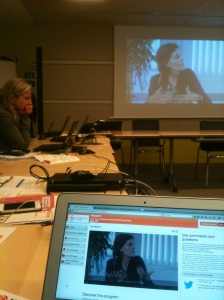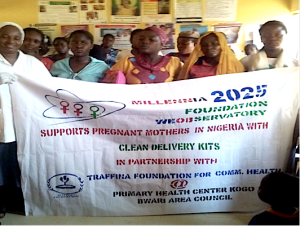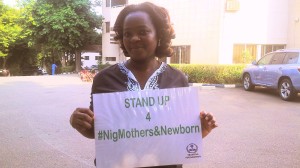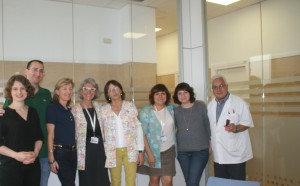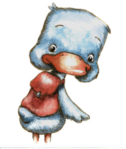Lady Murrugarra, a WeObservatory active partner, has shared her experience on working with Connecting Nurses and the Millennia2025Foundation through an interview that has been recently published in French on Infirmiers.com
We’ll publish the English version of the interview shortly on the blog.
Lady Murrugarra est une infirmière du Pérou spécialisée dans la E-Santé et la télémédecine. En 2013, elle poste son projet « e-Prevention in Latin America and Caribbean » sur Care Challenge, le site internet de Connecting Nurses destiné à offrir aide et visibilité aux idées et solutions de soins innovantes partagées par les infirmiers. Son projet est alors repéré par le WeObservatoryun observatoire créé conjointement par Connecting Nurses et la Fondation Millennia2025. Lady Murrugarra nous parle aujourd’hui de son expérience et de la manière dont son projet a évolué depuis qu’elle appartient à ce réseau d’infirmiers innovants.
Comment avez-vous découvert le projet « Connecting Nurses » ?
Lady Murrugarra – J’ai découvert « Connecting Nurses » par la Fondation Millennia2025. Je suis entrée en contact avec la directrice scientifique de la Fondation, Veronique Thouvenot, lors de la Conférence régionale de la République Dominicaine en 2013. Au départ, le contact s’est fait via Skype, puis je l’ai rencontrée en personne lors de Med‑e‑Tel 2014 à Luxembourg. Un accord de collaboration avec le WeObservatory pour un an, 2013 – 2014, a permis d’établir des objectifs pour faire connaître e-Prevention au niveau international et mener une enquête locale dans la zone andine de Cajamarca.
Pourquoi avez-vous décidé de lancer le projet e-Prevention ?
Lady Murrugarra – Cela fait plus de 20 ans que nous travaillons sur le thème de l’éducation en matière de prévention des maladies, et notre objectif est de fournir les outils nécessaires pour prévenir les maladies en Amérique Latine et dans les Caraïbes, sans discrimination de sexe, d’orientation sexuelle ou de condition des populations. Nous devons faire prendre conscience aux populations vulnérables de l’importance de prendre soin de leur santé. La seule solution est la prévention. Les technologies de l’information et de la communication (TIC) jouent un rôle très important en ce sens ; c’est pourquoi l’amélioration des réseaux téléphoniques et le projet d’un ordinateur par enfant (One Laptop per Child) sont déjà en cours de développement. Nous réalisons un travail avant tout social, en particulier à Noël, lorsque nous nous rendons dans les communautés vulnérables pour partager avec elles ce merveilleux moment. Nous avons cependant besoin de fonds pour continuer à former les leaders de la région andine et des Caraïbes. En ayant les outils appropriés, ils sont en mesure de transmettre les connaissances dans leurs régions. Ces fonds sont donc nécessaires pour atteindre les objectifs prévus et continuer à avoir un impact au niveau local, national et international.
En quoi consiste le projet ?
Lady Murrugarra – Le projet traite principalement de la prévention et du traitement des maladies infectieuses, dont la dengue. Les infirmières font partie d’une des catégories professionnelles à être en contact permanent avec les patients souffrant de cette maladie. Cependant, beaucoup d’entre elles, en raison de leur statut de mères, n’ont ni le temps, ni la place physique nécessaire pour organiser des cours et mettre à jour leurs connaissances. Le projet a permis la formation de 15 028 personnes de différents pays de la région. La formation est gratuite et, s’ils réussissent, les participants reçoivent un certificat. C’est pour cette raison que nous recherchons des fonds, pour que la formation soit gratuite pour le public et le personnel de santé.
Votre projet a été sélectionné par le WeObservatory de la Fondation Millennia2025. Quelles en ont été les conséquences ?
Lady Murrugarra – Nous en retirons de nombreux bénéfices ! Nous avons participé et présenté notre projet à des événements, parmi lesquels on peut citer :
Nous avons aussi organisé la « Journée mondiale du sida 2014 », et encadré des événements sur la télémédecine et la télésanté organisés à Lima (Pérou) en 2014 :
Quels sont vos projets futurs au Pérou ?
Lady Murrugarra – Nous continuerons à affronter les défis auxquels nous faisons face conjointement avec l’État, les entreprises privées et les autres institutions qui nous sollicitent pour travailler ensemble. La télémédecine est déjà une réalité au Pérou, via différents canaux : télémédecine, télésanté, téléconsultation, dossiers médicaux, création de logiciels pour un diagnostic rapide, e-learning. Nous espérons que nos activités participeront à faire que les technologies de l’information et de la communication se répandent et facilitent la prévention et le traitement des maladies, et nous continuons à œuvrer pour que l’éducation et la formation deviennent par ce canal accessibles au plus grand nombre.
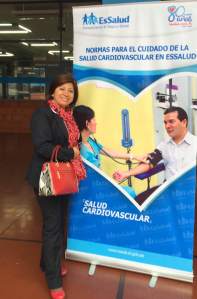 Nurse Lady Murrugarra presented her project ePrevencion on 26 May 2016 at the Hospital Edgardo Rebagliati in Lima, Peru. The focus was on TeleHealth and Teleconsultation for Cardiovascular Health.
Nurse Lady Murrugarra presented her project ePrevencion on 26 May 2016 at the Hospital Edgardo Rebagliati in Lima, Peru. The focus was on TeleHealth and Teleconsultation for Cardiovascular Health. Nurse Lady Murrugarra presented her project ePrevencion on 26 May 2016 at the Hospital Edgardo Rebagliati in Lima, Peru. The focus was on TeleHealth and Teleconsultation for Cardiovascular Health.
Nurse Lady Murrugarra presented her project ePrevencion on 26 May 2016 at the Hospital Edgardo Rebagliati in Lima, Peru. The focus was on TeleHealth and Teleconsultation for Cardiovascular Health.




